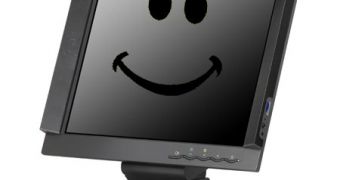Geeks can be now proud of their robotic jokes: they won't laugh alone now! An American team has created a computer that can 'become aware' of a joke and laugh at it. The software could be useful for offering the robot companions or helpers of the future an artificial sense of humor.
The human sense of humor is something really complex, but the team made of Julia Taylor and Dr Lawrence Mazlack at the University of Cincinnati in Ohio developed a software that detects jokes based on puns which do not fit different definitions of similar sounding words. A database permits the software to verify if each word in a sentence fits with the context and meaning of the other words.
A discrepancy between the word and its context makes the program look for a pronunciation guide for similar sounding words. If any of the similar sound words fit better within the original sentence, it identifies it as a joke and starts laughing. For instance, this is a type of joke it detects: "How was your trip to Helsinki?", "Terrible, all our luggage vanished into Finn Air", as "Finn" does not match with luggage and air, but does resemble "thin".
This software could be integrated in robots expected to play an increasing role in providing companionship and medical assistance to elderly or diseased persons. Such gadgets will be more acceptable and pleasant if they can mimic human attributes like humor and empathy.
But the team admitted the software could only detect some types of puns based on word mismatch. Taylor is now trying to improve the software so that it could react to variation in the user's sense of humor.
"If you've been in car accident, you probably won't find a joke about a car accident funny." said Taylor.
These are types of jokes the software considered funny:
Mother: "My, you've been working in the garden a lot this summer." Boy: "I have to because teacher told me to weed a lot."
Property broker: "I tell you this new house has no flaws at all." Buyer: "Then what do you walk on?"
The software does connect "weed" with "working in the garden" but not with "teacher told me". This is what also happens with "flaws" and what the buyer wants to walk on. Substituting in "read" and "floors" irons this out, permitting the software to detect a play on words.
The software did not get it in this case:
Patient: "Doctor, doctor, I swallowed a bone." Doctor: "Are you choking?" Patient: "No, I really did!"
It found perfectly possible for someone to pay a visit to the doctor if he/she were choking; no incongruity made the computer unable to see the joke.

 14 DAY TRIAL //
14 DAY TRIAL //